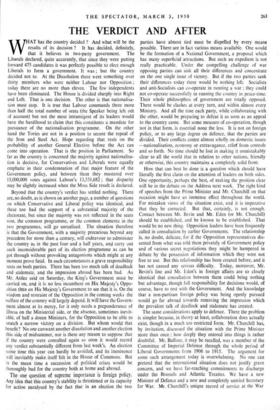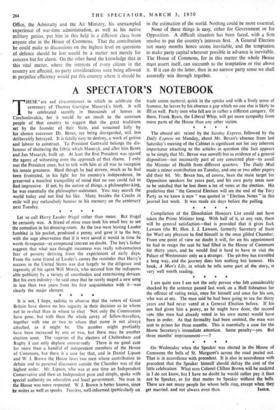THE VERDICT AND AFTER
WHAT has the country decided ? And what will be the results of its decision ? It has decided, definitely, that it believes in two-party government. The Liberals declared, quite accurately, that since they were putting forward 475 candidates it was perfectly possible to elect enough Liberals to form a government. It was ; but the country decided not to. At the Dissolution there were something over thirty members who were neither Labour nor Opposition ; today there are no more than eleven. The few independents have been eliminated. The House is divided sharply into Right and Left. That is one decision. The other is that nationalisa- tion must stop. It is true that Labour commands three more than half the total number of seats (the Speaker being left mit of account) but not the most intransigent of its leaders would have the hardihood to claim that this constitutes a mandate for pursuance of the nationalisation programme. On the other hand the Tories are not in a position to secure the repeal of the Iron and Steel Act. Hope regarding that rests on the probability of another General Election before the Act can come into operation. That is the position in Parliament. So far as the country is concerned the majority against nationalisa- tion is decisive, for Conservatives and Liberals were equally emphatic in their condemnation of that major feature of the Government policy, and between them they mustered over 15,000,000 votes against Labour's 13,331,682; that disparity may be slightly increased when the Moss Side result is declared.
Beyond that the country's verdict has settled nothing. There are, no doubt, as is shown on another page, a number of questions on which Conservative and Liberal policy was identical, and these too had the support of a substantial majority of the electorate, but since the majority was not reflected in the seats won, the common programme, or the common elements in the two programmes, will go unrealised. The situation therefore is that the Government, with a majority precarious beyond any precedent for more than a century, will endeavour to administer the country as in the past four and a half years, and carry out such inconsiderable part of its election programme as can be got through without provoking antagonisms which might at any moment prove fatal. In such circumstances a grave responsibility rests on both parties. There has been too much talk of deadlock and stalemate, and the impression abroad has been bad. As Mr. Attlee said on Saturday, the King's Government must be carried on, and it is no less incumbent on His Majesty's Oppo- sition than on His Majesty's Government to see that it is. On the wisdom and restraint of the Opposition in the coming weeks the welfare of the country will largely depend. It will have the Govern- ment almost at its mercy, for it only needs a preponderance of illness on the Ministerial side, or the absence, sometimes inevit- able, of half a dozen Ministers, for the Opposition to be able to snatch a narrow victory on a division. But whom would that benefit? No one can want another dissolution and another election this side of midsummer, nor is there any reason to suppose that if the country were consulted again so soon it would record any verdict substantially different from last week's. An election some time this year can hardly be avoided, and its imminence will inevitably make itself felt in the House of Commons. But in the mean time a succession of political crises would be thoroughly bad for the country both at home and abroad.
The one question of supreme importance is foreign policy. Any idea that this country's stability is threatened or its capacity for action paralysed by the fact that in an election the two parties have almost tied must be dispelled by every means possible. There are in fact various means available. One would be the formation of a National Goverment, a proposal which has many superficial attractions. But such an expedient is not really practicable. Under the compelling challenge of war opposing parties can sink all their differences and concentrate on the one single issue of victory. But if the two parties sank their differences today there would be nothing left. Socialists and anti-Socialists can co-operate in running a war ; they could not co-operate successfully in running the country in peace-time. Their whole philosophies of government are totally opposed. There would be clashes at every turn, and within almost every Ministry. And all the time each party, while collaborating with the other, would be preparing to defeat it as soon as an appeal to the country came. But some measure of co-operation, though not in that form, is essential none the less. It is not on foreign policy, or to any large degree on defence, that the parties are divided. Their conflicts centre almost wholly on domestic issues —nationalisation, economy or extravagance, relief from controls and so forth. No time should be lost in making it unmistakably clear to all the world that in relation to other nations, friendly or otherwise, this country maintains a completely solid front.
How that can best be done is a question which should have literally the first claim on the attention of leaders on both sides. One opportunity, perhaps the best, of making the position clear will be in the debate on the Address next week. The right kind of speeches from the Prime Minister and Mr. Churchill on that occasion might have an immense effect throughout the world. For mistaken views of the situation exist, and it is imperative that they be corrected. But that, certainly, is not enough. Contact between Mr. Bevin and Mr. Eden (or Mr. Churchill) should be established, and be known to be established. That would be no new thing. Opposition leaders have been frequently called in consultation by earlier Governments. The relationship is, no doubt, delicate, for if the Opposition representatives dis- sented from what was told them privately of Government policy and of various secret negotiations they might be hampered in debate by the possession of information which they were not free to use. But this relationship has been created before, and it has not caused any serious difficulty. Today, moreover, Mr. Bevin's line and Mr. Eden's in foreign affairs are so closely identical that consultation between them could bring nothing but advantage, though full responsibility for decisions would, of course, have to rest with the Government. And the knowledge that a non-partisan foreign policy was being openly pursued would go far abroad towards removing the impression which the prevalent talk of deadlock and stalemate has created.
The same considerations apply to defence. There the problem is simpler because, in theory at least, collaboration does actually exist, though in a much too restricted form. Mr. Churchill has, by invitation, discussed the situation with the Prime Minister more than once ; how deeply they entered into things is rather doubtful. Mr. Balfour, it may be recalled, was a member of the Committee of Imperial Defence through the whole period of Liberal Governments from 1906 to 1915. The argument for some such arrangement today is overwhelming. No one can pretend that the international situation does not justify grave concern, and we have far-reaching commitments to discharge under the Brussels and Atlantic Treaties. We have a new Minister of Defence and a new and completely untried Secretary for War. Mr. Churchill's unique record of service at the War Office, the Admiralty and the Air Ministry, his unexampled experience of war-time administration, as well as his native military genius, put him in this field in a different class from anyone else in the House of Commons. That the contribution he could make to discussions on the highest level on questions of defence should be lost would be a matter not merely for concern but for alarm. On the other hand the knowledge that in this vital matter, where the interests of every citizen in the country are affected, no party considerations were being allowed 10 prejudice efficiency would put this country where it should be in the estimation of the world. Nothing could be more essential.
None of these things is easy, either for Government or for Opposition. A difficult situation has been faced, with a firm resolve to put the country's interests first. A General Election not many months hence seems inevitable, and the temptation to make party capital wherever possible in advance is inevitable. The House of Commons, for in this matter the whole House must assert itself, can succumb to the temptation or rise above it. If it can do the latter, then in no narrow party sense we shall assuredly win through together.



































 Previous page
Previous page